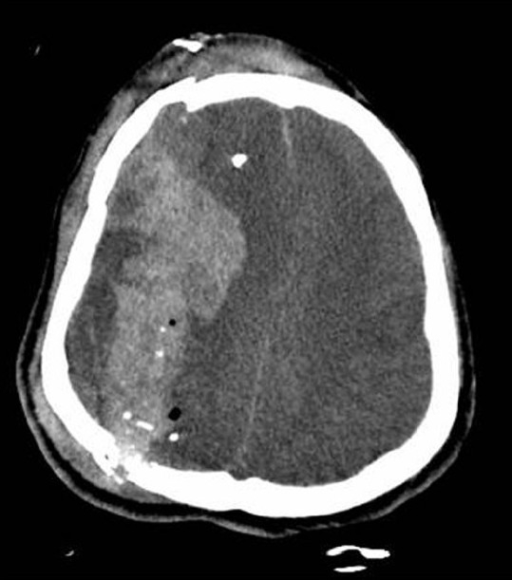Playlist
Show Playlist
Hide Playlist
Traumatic Brain Injury: Management
-
Slides Head Trauma Traumatic Brain Injury.pdf
-
Download Lecture Overview
00:00 Now let's talk about how we manage traumatic brain injury and let's start with management of mild TBI or concussion. 00:06 There are no specific disease modifying treatments, we really support patients through their traumatic brain injury. 00:14 Typically patients with more severe mild TBI will be observed and occasionally if there are symptoms, focal neurologic deficits, or some changes on the Glasgow Coma Scale still in that mild TBI category, we may consider CT imaging. 00:30 We avoid narcotics or anything that could alter the patient's mental status. 00:34 We want to closely follow their mental status and avoid medications that may be psychotropic or alter the patient's sensorium. 00:41 And we do treat symptoms. 00:42 We can control pain with things like acetaminophen or ibuprofen. 00:46 We control dizziness with with with medications meclizine that may help with dizziness, nausea can be treated and other symptomatic therapies. 00:56 How about management of moderate to severe TBI? These patients frequently will be hospitalized some in the intensive care. 01:03 So what is the intensive care management of a more moderate to severe TBI? Well, first we want to maintain euvolemia. 01:10 We don't want patients hypotensive. 01:11 We want to support maximal biochemical recovery and euvolemia with IV fluids is an important part of that. 01:18 We want to maintain cerebral perfusion pressure. 01:21 We want enough blood flow to get to the brain. 01:23 We avoid intracranial hypotension. 01:25 We avoid hypotension systemically. 01:28 Patients may be monitored for ICP, either clinically with the Glasgow Coma Scale or with a bolt, a device that measures intracranial pressure, and can report a readout to prevent and avoid spikes in intracranial pressure, which are an additional biochemical stress on the brain that should be avoided. 01:47 Patients who have a significant reduction in their Glasgow Coma Scale and are unable to protect their airway may require mechanical ventilation. 01:56 We want to correct coagulopathy and avoid risk factors for hemorrhage or manage hemorrhages that may have occurred, correcting coagulopathy that may develop around the stress of this traumatic event. 02:07 And then maintain optimal glucose and electrolyte status and homeostasis as well as body temperature again to reduce biochemical stress on both the brain and the body. 02:20 Seizure prophylaxis is necessary in many patients with more severe TBI and should also be considered in these patients. 02:27 Seizure is another biochemical stressor with the goal being to avoid. 02:34 How about management of more severe TBI and some of the surgical or non surgical considerations for those patients? One of the things we worry about as increase in intracranial pressure and they're both nonsurgical and surgical approaches to managing that condition. 02:48 Sedation and analgesia is also a temporizing measure. 02:52 CSF drainage through ventriculostomy can be considered. 02:55 Osmotic therapy, hypertonic saline or mannitol is given with the attempt to try and draw fluid outside from the brain inside the blood vessels and again as a temporizing or bridging measure to definitive management of ICP. 03:13 Some patients may require surgery, decompressive craniotomy or craniectomy. 03:18 Craniotomy to remove the skull, craniotomy to remove evacuate blood and then replace the skull for refractory ICP or significant clinical decline. 03:27 We may need to consider evacuation of a hematoma in symptomatic patients or when blood continues to progress and expand. 03:35 Closure of dura, debridement with an open skull fracture, or elevation of a depressed bone fracture may also be required.
About the Lecture
The lecture Traumatic Brain Injury: Management by Roy Strowd, MD is from the course Head Trauma.
Included Quiz Questions
Which class of pharmacologic treatment is usually contraindicated in a patient with a TBI?
- Opioids
- NSAIDs
- Anti-hypertensive medications
- Antibiotics
- Acetaminophen
In a patient with moderate-to-severe TBI, what would be an indication for ICP monitoring?
- GCS less than 9
- Focal neurologic deficit
- Confusion
- Elevated ammonia level
- Hypotension
If a patient does not respond to nonsurgical approaches for managing increased intracranial pressure, what surgical approach may be indicated?
- Decompressive craniotomy
- Withdrawal of life support
- Extubation
- Vasopressor therapy
- Basilar artery embolization
Customer reviews
5,0 of 5 stars
| 5 Stars |
|
5 |
| 4 Stars |
|
0 |
| 3 Stars |
|
0 |
| 2 Stars |
|
0 |
| 1 Star |
|
0 |




